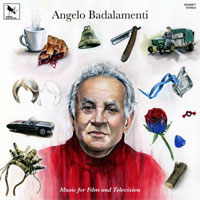Angelo Badalamenti • Music for Film and Television
Music for Film and Television was first released in 2010 on CD. It offered 14 tracks of Badalamenti's iconic music. The LP was released in late 2024, for Record Store Day Black Friday, and contains nine of those tracks, including themes from both Twin Peaks and Blue Velvet, as well as additional music from some of the movies and television series Badalamenti has composed over the years: A Very Long Engagement, Wild At Heart, The Comfort of Strangers, Mulholland Drive, The City of Lost Children, and The Straight Story. Despite the five missing musical examples, I was stoked to put the gleaming red vinyl record on the turntable and give it a spin. All of this dramatic music in one place -- it sounded too good to be true. In addition to the colored vinyl, the cover art by Brianna Ashby is quite interesting. It depicts, at various positions surrounding Badalamenti’s portrait, a number of iconic symbols from the cinematic dramas highlighted in the album. For example, there’s coffee and cherry pie (Twin Peaks), a gas mask (Blue Velvet), a log (Twin Peaks), and so on. Nice! Surprisingly, the first track, “Blue Velvet: Main Title Theme,” sounded nothing like what I had heard on the soundtrack album. What was going on? For starters, a different orchestra was used for the performances; instead of the Film Music of Prague Orchestra (later called the City of Prague Philharmonic Orchestra) heard on the original soundtrack, the Brussels Philharmonic-The Orchestra of Flanders was tasked with the performances. Also, the music heard presented new orchestrations of the original themes. I cued up “Twin Peaks: Laura Palmer’s Theme/Main Title Theme (Falling)(Medley)” on side two. Again, what I was hearing did not at all resemble what I had heard on the soundtrack album. Missing was the haunting, dark, dreamy atmosphere created by the sparse instrumentation of the intimate original recording. What I heard was more like a tone poem scored for full symphony orchestra. The mystery and sinister air the music was meant to suggest was absent. As I was soon to hear, the other themes, with the exception of the two excerpts from The City of Lost Children (which sounded to me like they were sourced from the original soundtrack recordings), received a similar treatment. Having new arrangements of the original orchestrations is fine by me, if they are done well. These were perfectly acceptable, and the album is quite satisfying in that it offers a good introduction to Badalamenti’s genius. However, from Blue Velvet I would have liked to have heard the haunting French-horn solo on “Mysteries of Love.” I was also surprised that Julee Cruise’s quintessential vocal on “The Nightingale,” from Twin Peaks, was left off the compilation. This release could have easily been a twofer, as there is enough recognizable music to be harvested in Badalamenti’s soundtracks to handily fill multiple LPs. His music deserves it, as I believe his oeuvre, though not as extensive as Ennio Morricone’s, will stand alongside his as a fine example of expressive, creative and sometimes unorthodox cinematic music making. For some reason, despite the high-quality pressing, courtesy of GZ Media, I found the sound bland, lacking in dynamics and clarity. As a consequence, I missed the energy and excitement of the musical moments. The sound is pleasant enough, but it did not have my senses on high alert, as my viewing of the miniseries had over three decades earlier. Despite that, for those wanting a sample of
Badalamenti’s excellence in composition, orchestration and creating a spell, this
album is for you. It'll whet your appetite for more and likely send you seeking out the
original soundtrack albums. |

 have been a fan of the late, Grammy Award-winning composer Angelo
Badalamenti since Twin Peaks debuted on Sunday April 8th 1990. For the next seven
weeks, millions of viewers and I sat glued to the television as David Lynch’s
unhinged story of Laura Palmer’s murder unfolded. The unsettling story was bathed in
some of the most dreamlike music I have heard, and I sought it out. As soon as it became
available (as an import-only LP), I bought the soundtrack album and listened, mesmerized
by the haunting, shadowy music contained therein. I was similarly impressed with
Badalamenti’s music from Lynch’s 1986 movie Blue Velvet. It was equally
dark and foreboding and left me searching for the vinyl album, which was finally released
two years ago.
have been a fan of the late, Grammy Award-winning composer Angelo
Badalamenti since Twin Peaks debuted on Sunday April 8th 1990. For the next seven
weeks, millions of viewers and I sat glued to the television as David Lynch’s
unhinged story of Laura Palmer’s murder unfolded. The unsettling story was bathed in
some of the most dreamlike music I have heard, and I sought it out. As soon as it became
available (as an import-only LP), I bought the soundtrack album and listened, mesmerized
by the haunting, shadowy music contained therein. I was similarly impressed with
Badalamenti’s music from Lynch’s 1986 movie Blue Velvet. It was equally
dark and foreboding and left me searching for the vinyl album, which was finally released
two years ago.